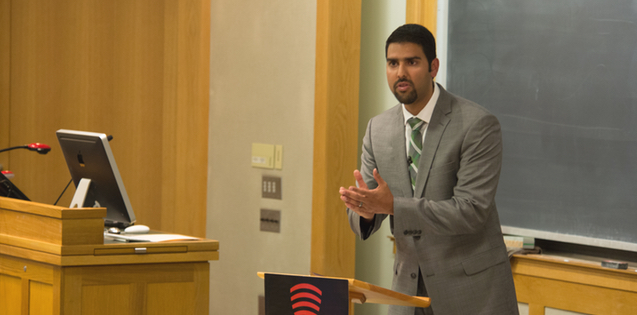New York Times bestselling author Nabeel Qureshi has a personal stake in making sure that American Muslims are not misunderstood and persecuted: Although he is a Christian, he grew up in a loving Muslim family that still practices Islam.
Qureshi’s journey to becoming a Christian began in medical school when he was debating matters of faith with a fellow student, who was a Christian. Qureshi read the Bible for the purpose of research, and eventually, he embraced Christ as Lord, rather than simply a prophet. In the years following, Qureshi wrote the bestselling book Seeking Allah, Finding Jesus. Qureshi talked about his conversion in a 2014 interview with Boundless.
The recent rise of violence from some Muslim groups has troubled Qureshi and prompted him to write a new book, Answering Jihad: A Better Way Forward, to provide clarity amidst the cacophony of voices speaking out about what defines Islam. In an interview with Boundless, he began by addressing how Christians should approach their Muslim neighbors if they do not trust them.
1. In your book, you reject the idea that Islam is a “religion of peace,” because, as you say, “violence is writ large throughout the pages of Islamic history, including in its foundations.” But at the same time, you say “that does not mean our Muslim neighbors are violent.” The reassurance about Muslim neighbors is cold comfort for people who fear that, under the right circumstances, belief in a violent religion could beget violent action. How should Christians, in particular, love their Muslim neighbors if they find themselves struggling to trust them?
We do this by keeping our eyes on Jesus! Jesus loved His enemies, even those who were crucifying Him! In Luke 23:34, Jesus says of His crucifiers, “Father, forgive them, for they do not know what they are doing.” Truly, we are the ones Jesus died for — how beyond hope this world would have been if Jesus had waited for evidence that He could trust us before loving us! We, as Christians, have been called to live like Jesus, to transform this world by God’s radical grace through us, even dying for it if we have to. The sooner we realize that this is our mission, the sooner the world will be transformed. Until then, though we call ourselves “Christians,” we won’t be living like Christ, so we will be taking the Lord’s name in vain.
For non-Christians, though, I would emphasize that people are not purely logical systems. Though their worldview might be built upon violent foundations, this does not mean they will become violent. Most people never investigate their worldview, let alone live consistently with it. When they do investigate it, though, it behooves us to be present and help them process what they find. When Muslims are finally confronted with the reality of Islam’s violent foundations, they will reach an important intersection in their lives and will pick one of three paths: apostasy, apathy or radicalization. Let us not shy away from being their friends — that way, we can walk with them before they reach that fork in the road. Only then will we have earned the right to speak into their decisions and lead them away from the path of radicalization.
2. To a lot of Christians, you’re something of a folk hero because you came from Islam to Christianity and now publicly proclaim Christ. How does it feel to know that some of those same people would view you with derision if you hadn’t yet begun following Jesus?
Your question hits close to home on why I constantly encourage Christians to love their neighbors. Any suspicion or derision that they mete out to a Muslim could be pushing away my cousin or my uncle. In fact, it could be pushing away the next Paul. Let us not forget that Paul was himself a great persecutor of the church, and yet God used this man as a vessel to compose Scripture. Romans, Philippians, and First Corinthians, just to name a few, were written by a man whom some people today describe as a “terrorist” before he met Jesus. If God encouraged Christians to love a “terrorist” when the church had all the fragility of a newborn, how much more ought we be willing to love our peaceful Muslim neighbors as a full-grown, global body of Christ?
3. The thing that first struck me about Answering Jihad was the dedication. You dedicate it to your sister and then say, “I miss how close we were in our childhood … You are the most loving sister a younger brother could ask for. I pray that your love for people would extend into a love for truth. I am begging God for the day that we can worship Him together.” That’s provocative, Nabeel. I mean, you basically come right out and say that she doesn’t love truth. Are you worried about how she will respond if she sees this?
Leaving Islam is not easy for anyone from a devout Muslim background. I was a strong-willed young man when I was investigating Islam and Christianity, choosing to pursue the evidence wherever it led me. Even though that was the case, when it came time to make my decision and follow Jesus, I knew how much it would hurt my family, and I found it very difficult to follow the truth, given the cost.
But leaving Islam is especially difficult for people who are “people pleasers.” They are naturally predisposed to make people happy, and leaving Islam would result in a catastrophic destruction of relationships, a people pleaser’s nightmare.
My sister is one of the most tenderhearted people I have ever had the honor of knowing, and that means she is constantly considering the happiness of her family. She is willing to sacrifice anything for them, but I fear that might include a pursuit of the truth.
In my dedication, I remarked that I pray her “love for people would extend into a love for truth.” In reality, the two are not at odds with one another. If those of us who were raised Muslim really love our families, we would want them to know the one true God. That means pursuing the truth can be an extension of our love for people, and I think deep down, a people pleaser has to recognize this in order to take the step of following Jesus.
4. On a related note, how do your parents view your ministry? I mean, if my son became a Muslim and was a spokesman for “the truth of Islam” — meaning that what I taught him was a lie — I would be devastated and hurt. There’s nothing he could say to make me feel better about it.
We try not to talk about it. It has taken the better part of a decade to start rebuilding our relationships, and we have only just begun to function like a family again. For the time being, we realize that discussing religion or my ministry is counter-productive, so we don’t broach those topics.
That said, I would challenge the notion that a person is lying simply because what he says isn’t true. People who are well meaning can be mistaken, or they can unwittingly conflate loyalty to religious heritage with devotion to God. I think we ought to be careful with emotionally and judgmentally charged terms like “lie.”
5. Do you think it’s possible for someone to be a Muslim and believe enough of the truth about Jesus to be saved and spend eternity with God?
To be a Muslim, you have to accept Muhammad as your ultimate human authority, and you have to accept the Quran as the written word of Allah. Both Muhammad and the Quran require Muslims to deny that Jesus is God, that Jesus died on the cross, and that Jesus can take the sins of mankind upon Himself. In fact, the Quran teaches that believing Jesus is God will send you to hell (5:72). In my new book, Answering Jihad, I even show that the Quran teaches Muslims to subjugate Christians because Christians believe Jesus is God (9:29-33). Islam makes no attempt to hide or obfuscate the matter: You cannot be both a Christian and a Muslim.
On this matter, the Bible agrees. It teaches that Christians must “confess with your mouth that Jesus is Lord and believe in your heart that God raised Him from the dead” in order to be saved (Romans 10:9). Islam specifically denies what the Bible teaches you must believe in order to be saved.
This is why, for Christians, it is so inestimably important that we live lives worthy of the calling we have received (Ephesians 4:1), and to make disciples of all people (Matthew 28:19). In the past 14 years, more Muslims have turned to Christ than in the previous 1,400 years. I am one of those former Muslims, and I testify that the Spirit is moving powerfully in the house of Islam. Almost every day I receive messages from converts rejoicing that they now know the Lord.
The harvest is ready, and I pray that the Lord will send the readers of this interview as workers into His harvest (Matthew 9:38). There is no greater calling than this.
To follow Nabeel Qureshi on Twitter, you can find him @NAQureshi, and you can pre-order his book here.












